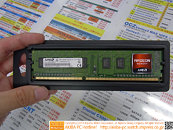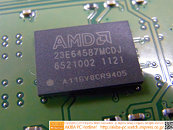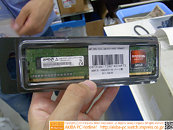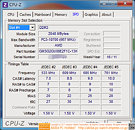Monday, August 8th 2011

AMD Starts Selling Radeon-branded DDR3 Memory Modules
At first glance, one would have discarded the news as some company's attempt to use the AMD brand to sell memory modules, but it is indeed AMD selling memory. AMD is selling Radeon-branded DDR3 memory modules to the consumer market, not just OEMs, which were spotted in stores in Japan. AMD is selling certified DDR3 memory in three segments: Entertainment, UltraPro Gaming, and Enterprise. Entertainment deals with DDR3-1333 MHz modules that are best suited for home and business client PCs, UltraPro Gaming deals with DDR3-1600 MHz modules suited for gaming PCs of all shapes and sizes, while Enterprise deals with registered un-buffered DDR3 memory for use in AMD Opteron-driven servers and workstations.
While baffling, the move to sell its own-branded memory makes some sense. High performance DDR3 memory kits sold in the market today that operate at DDR3-1600 rely on Intel eXtreme Memory Profiles (XMP), a proprietary SPD extension by Intel to let users set the marketed speeds easily. AMD platform motherboards don't support XMP, leaving it at an obvious disadvantage. Radeon-branded memory use JEDEC profiles for 1600 MHz, along with certified timings and voltages to run stable and perform optimally. It might also be using AMD's own SPD extension called "Black Edition profiles", but CPU-Z doesn't seem to be able to spot that. Pictured below is the Entertainment 2 GB module, which uses AMD-branded memory chips. In Japan, the 2 GB module is priced at the equivalent of US $20. Other pricing information is unknown for the moment.UPDATE (11/8): We contacted AMD to talk a little bit about these new memory products that surfaced literally out of nowhere. AMD told us that these are channel products, and as such they don't plan to sell it in a big way on the retail market:
Source:
PC Watch
While baffling, the move to sell its own-branded memory makes some sense. High performance DDR3 memory kits sold in the market today that operate at DDR3-1600 rely on Intel eXtreme Memory Profiles (XMP), a proprietary SPD extension by Intel to let users set the marketed speeds easily. AMD platform motherboards don't support XMP, leaving it at an obvious disadvantage. Radeon-branded memory use JEDEC profiles for 1600 MHz, along with certified timings and voltages to run stable and perform optimally. It might also be using AMD's own SPD extension called "Black Edition profiles", but CPU-Z doesn't seem to be able to spot that. Pictured below is the Entertainment 2 GB module, which uses AMD-branded memory chips. In Japan, the 2 GB module is priced at the equivalent of US $20. Other pricing information is unknown for the moment.UPDATE (11/8): We contacted AMD to talk a little bit about these new memory products that surfaced literally out of nowhere. AMD told us that these are channel products, and as such they don't plan to sell it in a big way on the retail market:
AMD does not manufacture memory and does not plan to sell system memory directly to our customers. AMD is currently determining if the sale of AMD Radeon-branded memory through channel partners is a viable opportunity and as such it has appeared in some regions for purchase through retail.




53 Comments on AMD Starts Selling Radeon-branded DDR3 Memory Modules
Why have AMD decided to push budget ram though surely that's bad for brand image?
I wonder how will theses clock?
Good to see AMD getting their fingers into more pies, you'd think that with OCZ pulling from the ram market there would be some wiggle room for someone else. :)
And now people will start wondering whether or not they'll need AMD memory to make their AMD based system perform good.:ohwell:
Hey Extrasalty look at the stock markets today everything is low ....If it get`s lower expect to start paying more for everything.Also F1 cancelled the Japan Grand Prix,Also Indy cars why ....Radiation .
The real profit obviously comes from trying to confuse average consumers instead of guaranteeing compatibility.
option 2: Core i7 + intel chipset based mobo + Generic DDR3 + Radeon graphics card
option 3: Core i7 + intel chipset based mobo + Generic DDR3 + Nvidia grapics card
option 4: Core i7 + intel chipset based mobo + Radeon DDR3 + Radeon graphics card
option 5: Phenom II + AMD chipset based mobo + Generic DDR3 + Nvidia graphics card
option 6: Phenom II + AMD chipset based mobo + Radeon DDR3 + Nvidia graphics card
option 7: Phenom II + AMD chipset based mobo + Radeon DDR3 + Radeon graphics card
option 8: Phenom II + AMD chipset based mobo + Generic DDR3 + Radeon graphics card
out of 8 combinations, AMD products appears in 6. You barely scape from AMD domination :D
I think that the memory is a good idea. The majority of computer users have no idea what is compatible with each other. If retailers bundle these things with the processors, it is a guaranteed sale given that someone who isn't too computer saavy purchases them.
i'm sick to death of fixing systems where the only problem is users who installed ram and never manually set the voltages and timings right - and ram with JEDEC voltages and proper SPD timings is exactly the solution.
Edit: to clarify, i mean this is perfect for office PC's, budget gaming systems, etc. memory timings really dont change gaming performance as much as other components like CPU and GPU, so cheap compatible ram is exactly what 90% of users want (and most of those who get faster ram, never end up setting it to those faster settings anyway)
with office rigs in mind that's actually pretty nice.
Buy an AMD CPU and a percentage gets cut from the price of the RAM if you purchase both.
Other wise I don't think many people will be going for these unless the average consumer thinks, "I have an AMD processor so this AMD RAM should run the best with it".
OCZ AMD Black Edition 4GB (2 x 2GB) 240-Pin DDR3 SDRAM DDR3 1600 (PC3 12800)